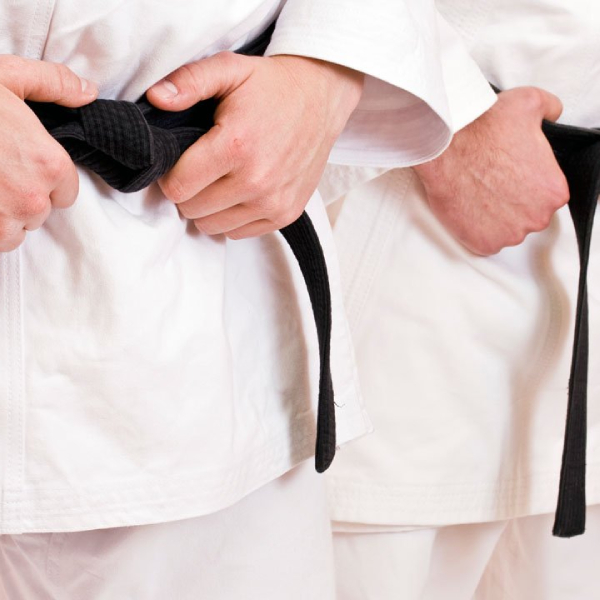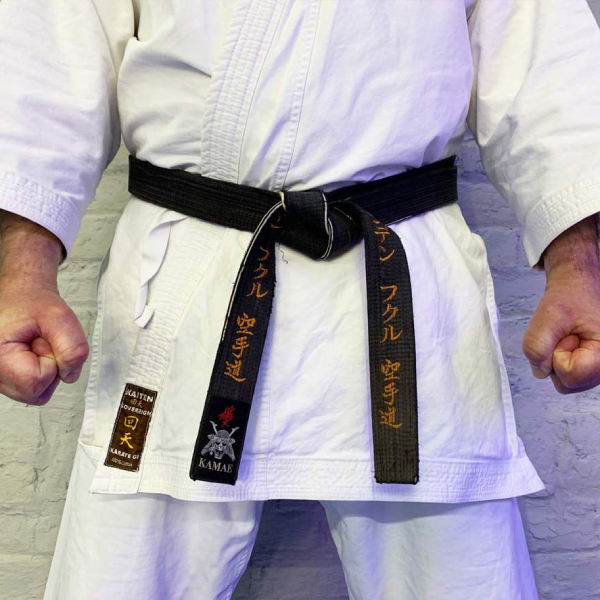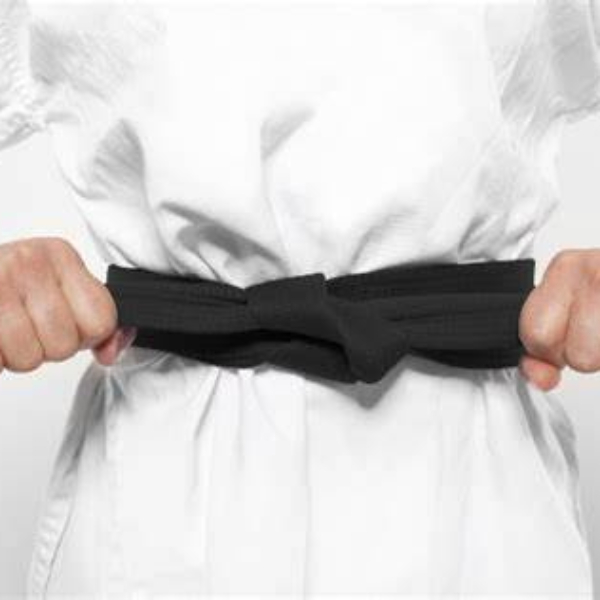Physical Address
304 North Cardinal St.
Dorchester Center, MA 02124
Physical Address
304 North Cardinal St.
Dorchester Center, MA 02124

A black belt in karate carries deep meaning. It represents years of dedication, practice, and discipline. Those who achieve it have shown commitment to the martial art’s principles and techniques. The rank is not just about skills. It’s a symbol of the person’s inner growth and understanding.
Earning this rank is a milestone. It tells the world the karateka has a level of proficiency. But this achievement is not an endpoint. A black belt signals the start of a more profound journey into the martial arts. It’s the beginning of a lifelong learning process.

The journey to a black belt also involves character development. Core values like respect, humility, and perseverance become intertwined with the physical training. Those who hold a black belt not only demonstrate mastery of karate moves but also an evolved character, making them role models within and outside the dojo. Achieving a Six Sigma black belt requires not only technical proficiency and problem-solving skills but also a commitment to continuous improvement and teamwork, highlighting the importance of character development alongside professional mastery.
Attaining a black belt requires an attitude geared toward continuous improvement. Desire plays a key role in this process. A strong desire for excellence drives the karateka to refine their skills and knowledge. It’s about becoming a black belt, rather than just getting one.
Karate training offers benefits that extend far beyond the dojo. The lessons learned on the journey to achieving a black belt—self-control, focus, resilience—apply to all areas of life. Through karate, individuals become empowered, gaining confidence and leadership qualities that serve them in various settings.
In conclusion, the significance of a black belt in karate is vast. It’s an emblem of years of training, a sign of mental and physical growth, and a step in a never-ending path of personal development and mastery.
The belt ranking system is a relatively recent practice in martial arts. Before this system, mastery was determined purely by ability, not by belt color. The systematic use of belt colors was first introduced by Jigoro Kano, the founder of judo, in the 1880s. He aimed to create a visible sign of a student’s progress and rank. Initially, in judo, there were only white and black belts. This system made it easier for students to set goals and mark their achievements.
Over time, the concept of using belt colors spread to other martial arts, including karate. More colors were added to represent different levels. This allowed a more nuanced progression through the ranks. The expansion of belt colors happened in the early 1900s. The new color system enabled practitioners to celebrate small victories on their path to black belt in karate. Just as the evolving belt color system in karate allows practitioners to celebrate their journey towards mastery, the Six Sigma Green Belt signifies a key milestone in continuous improvement, empowering individuals to achieve proficiency in process management and contribute meaningfully to their organizations.
Today, the belt ranking system remains prevalent. It serves to structure curriculum, organize student progress, and encourage continuous development. Yet, it’s important to recognize the belt as a stepping stone, not the ultimate goal. The rank one holds should reflect their skills and understanding of the martial arts. But true mastery goes beyond the belt’s color or rank.
In essence, the belt ranking system brings clarity, motivation, and structure to martial arts training. However, the heart of karate remains in the consistent practice, the deepening of knowledge, and the cultivation of character, far beyond the material aspect of the belts themselves.
The pursuit of a black belt in karate often begins with a desire for achievement. But the true meaning of becoming a black belt goes significantly deeper. It’s more than a symbol of accomplished skills; it’s about embracing an ongoing process of personal growth and mental refinement.
Earning a black belt symbolizes one has reached a basic proficiency in karate. Like a bachelor’s degree, it indicates a foundation has been laid. It is a recognition of one’s dedication to mastering the basic principles and techniques of karate. Yet, this is just a springboard into advanced learning and deeper comprehension of the martial art.
To truly become a black belt means to continue pushing personal boundaries. It involves developing a level of discipline that propels one to train consistently, with focus and determination. It means embodying the essence of karate with humility and respect, both in and out of the dojo. A true black belt holder becomes a figure of inspiration, leading by example and sharing knowledge.
Being a black belt also signifies a readiness to instruct, to pass on the art to others. This role requires an understanding of karate that goes beyond physical ability—it requires insight into coaching and guiding students, plus a deep appreciation for the martial art’s philosophy.

In essence, the journey to a black belt is about transformation. It’s about becoming the epitome of the principles one practices. It’s a commitment to a lifetime of learning and an openness to constant self-improvement. The belt is not merely an accessory worn around the waist—it’s a testament to the wearer’s spirit, discipline, and the rigorous path they’ve chosen to walk.
The journey of a karate student doesn’t end with the black belt. This rank is only a milestone, indicating that the student is ready for more advanced challenges. Beyond the black belt, there is an ongoing process of deepening martial arts knowledge and refining techniques. Continual growth in karate is about more than just learning new moves—it’s about enhancing one’s character and embodying the values of karate in daily life.
Karateka who continue their journey after achieving a black belt often take on new roles. They might become mentors or instructors, guiding others on their paths and enriching the karate community. As they teach, they also learn, gaining new insights into the martial arts and themselves.
Continuous improvement is a core philosophy in karate. Karateka strive to perfect their form, increase their understanding of the art, and improve their physical fitness. With each training session, they aim to be better than they were in the last. This dedication to growth can translate into personal and professional spheres, as the discipline and focus acquired in karate training carry over into all areas of life.
Achieving a black belt is a moment of pride and joy, but it’s the lifelong pursuit of excellence that truly defines a karateka. The journey beyond black belt isn’t just about individual growth—it’s about contributing to the karate community, inspiring others, and applying the principles of karate to make a positive impact on the world.
Many view a black belt in karate as a final goal. But it’s really just a mid-point. The black belt marks a certain level of skill and knowledge. Yet there’s much more to learn beyond it. Think of it as an intermediate achievement. It’s like graduating from basic training in martial arts.
In the Kyu-Dan ranking system, the black belt is not the end. Colors below black reflect the Kyu, the learner’s phase. The Dan ranks, starting with black, mark deeper mastery. There are usually 10 Dan ranks in karate. This shows the black belt is nearer the start than the finish.
A black belt does mean you’ve worked hard and learned the basics well. It’s a symbol of dedication and growth. Still, it’s not an expert rank. The journey and practice continue. A black belt is ready to face more advanced challenges in karate and life.
To sum up, the black belt is not a final destination. It’s a stepping stone to higher learning and personal development. Those who earn it must keep striving. They must push forward in their martial arts journey and life growth.
The black belt in karate is not just a sign of skill; it reflects deep discipline and character growth. To develop as a martial artist involves more than just physical training. It demands a consistent display of strong values and self-control.
Discipline is the bedrock of karate. It’s the force that drives you to practice, even on days you don’t feel like it. It’s what makes you repeat a kata hundreds of times until you get it right. Discipline pushes you to improve bit by bit, constantly.
Character is what you build along with your skills. Respect, humility, perseverance – these traits become as much a part of you as the techniques you master. As a karateka moves toward a black belt, these qualities are expected to be present.
A black belt also embodies leadership. It means you lead by example, show integrity and help others when they need guidance. A true black belt holder is a figure of respect, not just for their skills but for the kind of person they have become.
In the dojo, character is taught alongside stances and strikes. It’s not enough to perform a perfect kick. A black belt must also do so with the right attitude. They must carry the spirit of karate in their actions and choices, every day.
Thus, the role of discipline and character in developing a black belt is crucial. Without them, the belt becomes a mere accessory. With them, it symbolizes a way of life that upholds the highest standards within and beyond the dojo walls.
Attaining a black belt in karate depends greatly on the learner’s attitude and desire. This journey is about more than physical skills; it’s about maintaining a positive attitude. The right mindset fuels perseverance through tough training sessions and setbacks. It shapes a karateka’s journey towards mastering karate principles and techniques. Desire plays a decisive role too. It’s the burning wish to excel, not just for a belt, but for personal betterment. This yearning drives continuous effort and improvement long after earning the black belt. Just like attaining a black belt in karate, achieving a Six Sigma Yellow Belt requires a strong mindset and desire, where perseverance through challenges and a passion for personal improvement are key to mastering the principles of process excellence.
Those with a strong desire confront challenges with determination. They don’t seek shortcuts but value what each step teaches them. Their attitude sees them view the black belt as a milestone, not an endpoint. It’s a symbol of one’s commitment to never-ending growth, not just a rank achieved. In the dojo, an enthusiastic attitude can be infectious, inspiring others and creating a vibrant learning environment. With a core of diligent desire, the progress towards and beyond a black belt becomes a meaningful, lifelong pursuit.
Training in karate offers benefits that reach far into life. Even after earning a black belt, the lessons learned continue to have an impact. These are not limited to physical fitness or the ability to defend oneself. The true value lies in the mental and emotional growth that comes with this ancient practice.
Karate instills discipline and focus, which can lead to success in various aspects of life. It teaches goal setting and the determination to achieve them. The perseverance developed in the dojo becomes a valuable trait in one’s personal and professional life. Learning to face and overcome challenges on the mats equips individuals to do the same in real-world situations.
Furthermore, karate promotes holistic well-being. Regular practice improves health, reduces stress, and encourages a balanced lifestyle. The social aspect of training in a dojo leads to lasting friendships and a supportive community. As individuals progress in karate, they often experience improved self-esteem and confidence.
The principles of karate, such as respect and honor, guide a person’s interactions with others. These principles encourage a positive attitude, which can enhance personal relationships. They also foster a sense of responsibility to oneself and to the community.
The journey of karate training is endless. There is always more to learn and ways to grow. The black belt is a significant milestone, but it is the ongoing practice that enriches life. For many, karate becomes a lifelong pursuit, bringing continual learning and joy.

In summary, karate training goes beyond the dojo and a black belt. It shapes character, boosts physical and mental health, and nurtures a supportive community. It is a path that offers lifelong rewards.